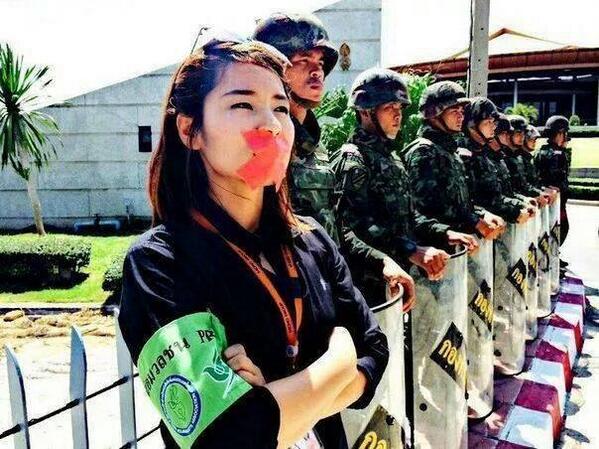Thailand: The militarisation of society

A Thai journalist protests next to troops over concerns about freedom of speech. Photo by @redbamboo16 on Twitter.
For more on Thailand, click HERE.
By Giles Ji Ungpakorn
June 29, 2014 – Links International Journal of Socialist Renewal – As the autocratic rule of Big Brother Generalissimo Prayut Chan-ocha trundles forward, we are seeing the militarisation of politics, economics and society.
All government ministries are controlled by military personnel. Civil servants who were in post before the coup are being replaced by those who are loyal lapdogs or cronies of the junta.
New executive board members have been appointed to state enterprises, with military men on every board and with Generalissimo Prayut as overall chair. Civilian cronies are carefully chosen from among the ranks of the whistle-blowing middle class mobs who hate democracy.
Piyasawat Amaranan, who has been appointed to the state oil company PTT is a good example. He sits side by side with Prayut’s army assistant General Paiboon Kumchaya. Historically the military has always used the state enterprises as cash cows to line their own pockets. This is especially the case with the profitable ones like PTT or the Airports Authority. This corrupt tradition started with the dictatorships in the 1950s. Prayt wants to turn the clock back.
Prayut has also put himself in charge of the economy. There is a Yorkshire saying: “Where there’s muck, there’s brass.” Perhaps it’s more like “where there’s a buck, there’s top brass”.
Conveniently, the so-called Counter Corruption Commission has stated that junta members do not have to declare their ill-gotten earnings before and after holding office, unlike previously elected politicians. The commission is desperately trying to find a dubious corruption charge to stick on former Prime Minister Yingluck Shinawatra. This would be the “legalistic” way to bar her from politics. Maybe there would be chance of dissolving the Peu Thai Party too.
Schools are having to change their curriculums to follow the dictates of the junta. Discipline, nationalism and love of Big Brother are emphasised in the new moral code. But education must be done on the cheap because the education budget has been cut in order to fund the bloated military and junta budget. Many infrastructural modernisation plans have been cut. Some may be resurrected, but that could be a new opportunity for companies to put in new bids and pay bribes to the junta members.
The junta has reassured the mass media that sending in troops to sit in their offices is “nothing to worry about”. The media are free to report the news. They just have to avoid reporting anything critical of the junta. What could be more democratic and free than that?
After the 2006 coup, the previous junta wrote a military constitution and packed the so-called independent bodies with loyal supporters. They did the same with half the senate and the courts. These anti-democratic bodies worked hand in hand with Sutep’s Democrat Party mobs to bring down the Yingluk government just before the May 2014 coup. But it was a long drawn-out process and the conservatives had no choice but to allow Yingluck and Thaksin Shinawatra’s parties to win genuine elections.
This time the junta wants to make sure this never happens again. This is behind the changing of top civil servants and the coming appointment of a Burmese-style Constitutional Drafting Assembly, made up of soldiers and anti-democratic civilians. One “excellent” candidate for the military appointed assembly would be Surapon Nitigraipoj, vice chancellor of Thammasart University, who thinks that the elected Yingluck government was just a dictatorship. According to him, all that the coup did was to bring in uniforms.
Forward to Thailand’s New Order, Suharto-style “Dwifungsi” and the "Guided Democracy"!
[Giles Ji Ungpakorn is a political commentator and dissident. In February 2009 he had to leave Thailand for exile in Britain because he was charged with lèse majesté for writing a book criticising the 2006 military coup. He is a member of Left Turn Thailand, a socialist organisation. His book, Thailand’s Crisis and the Fight for Democracy, will be of interest to activists, academics and journalists who watch Thai politics, democratisation and NGOs. His website is at http://redthaisocialist.com/.]